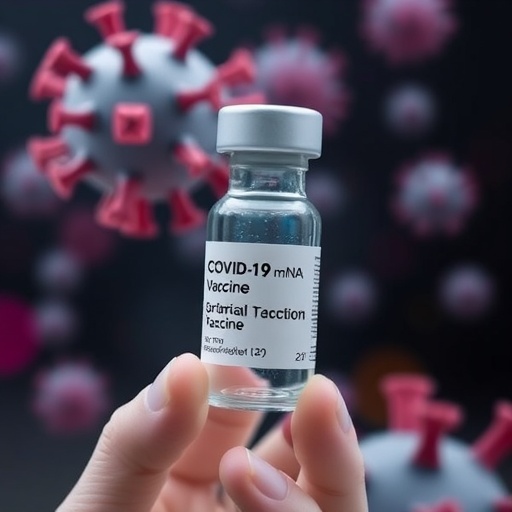

 image: Elias Sayour (left) works in the lab.
image: Elias Sayour (left) works in the lab. view more
Credit: UF Health/Jackie Hart
Patients with advanced lung or skin cancer who received a COVID-19 mRNA vaccine within 100 days of starting immunotherapy drugs lived significantly longer than those who did not get the vaccine, researchers have found.
The observation by researchers at the University of Florida and the University of Texas MD Anderson Cancer Center is a defining moment in a decade-plus of research testing mRNA-based therapeutics designed to “wake up” the immune system against cancer. Building on a previous UF study, the observation also marks a significant step toward a long-awaited universal cancer vaccine to boost the tumor-fighting effects of immunotherapy.
The findings from an analysis of more than 1,000 patients’ records at MD Anderson are preliminary, but if validated in a randomized clinical trial now in design, the study could have a widespread clinical impact.
“The implications are extraordinary — this could revolutionize the entire field of oncologic care,” said senior researcher Elias Sayour, M.D., Ph.D., a UF Health pediatric oncologist and the Stop Children’s Cancer/Bonnie R. Freeman Professor for Pediatric Oncology Research. “We could design an even better nonspecific vaccine to mobilize and reset the immune response, in a way that could essentially be a universal, off-the-shelf cancer vaccine for all cancer patients.”
Jeff Coller, Ph.D., a leading mRNA scientist and professor at Johns Hopkins University, said the findings point to yet another way Operation Warp Speed — part of the federal government’s early response to COVID-19 — continues to save Americans’ lives in “unique and unexpected ways.”
“The results from this study demonstrate how powerful mRNA medicines truly are and that they are revolutionizing our treatment of cancer,” Coller said.
Presented today at the 2025 European Society for Medical Oncology Congress in Berlin, the findings build upon Sayour’s eight years of work combining lipid nanoparticles and mRNA. Short for messenger RNA, mRNA molecules are found in every cell and carry the genetic information needed to make proteins.
Notably, Sayour’s lab reported a surprising finding in July: to prompt a strong antitumor reaction, they needn’t go after a specific target protein in a tumor; instead, they could simply rev up the immune system — as if fighting a virus.
Like a one-two punch, pairing Sayour’s patented experimental “nonspecific” mRNA vaccine with common anticancer drugs called immune checkpoint inhibitors triggered a strong antitumor response in lab mice. The experimental vaccine was nonspecific to COVID spike protein or any other virus or cancer but rooted in similar technology to the COVID vaccines.
That discovery, years in the making, sparked a question from former lab member and lead researcher Adam Grippin, M.D., Ph.D., who trained at UF’s Preston A. Wells Center for Brain Tumor Therapy and now works at MD Anderson.
Would the COVID-19 mRNA vaccine work like the nonspecific vaccine?
To find out, the research team analyzed existing data from patients with Stage 3 and 4 non-small cell lung cancer and metastatic melanoma treated at MD Anderson from 2019 to 2023.
What they found was that receiving a COVID mRNA vaccine within 100 days of starting immunotherapy drugs was associated with living longer by a significant amount.
The most dramatic difference, Sayour said, was in patients not expected to have a strong immune response, based on their tumors’ molecular makeup and other factors.
As with any observational study, the findings require confirmation from a prospective and randomized clinical trial.
Nonetheless, the discovery is pivotal.
“Although not yet proven to be causal, this is the type of treatment benefit that we strive for and hope to see with therapeutic interventions — but rarely do,” said Duane Mitchell, M.D., Ph.D., Grippin’s doctoral mentor and director of the UF Clinical and Translational Science Institute. “I think the urgency and importance of doing the confirmatory work can’t be overstated.”
In lung and skin cancers, doctors commonly engage the immune system with drugs designed to “release the brakes” and recognize and attack cancer cells more effectively. In advanced disease stages, however, most patients don’t respond well and often have exhausted other treatment options like radiation, surgery and chemotherapy.
The new study involved records of 180 advanced lung cancer patients who received a COVID vaccine within a 100-day period before or after starting immunotherapy drugs and 704 treated with the same drugs who did not receive the vaccine. Getting the vaccine was associated with a near doubling of median survival, from 20.6 months to 37.3 months.
Of the metastatic melanoma patients, 43 received a vaccine within 100 days of initiating immunotherapy, while 167 patients did not receive a vaccine. With the vaccine, median survival increased from 26.7 months to a range of 30 to 40 months; at the time the data were collected, some patients were still alive, meaning the vaccine effect could be even stronger.
Receiving non-mRNA pneumonia or flu vaccines resulted in no changes in longevity.
To back their findings, UF researchers then used mouse models to pair immunotherapy drugs with an mRNA vaccine targeted specifically at COVID spike protein. Those experiments showed they could turn unresponsive cancers into responsive ones, thwarting tumor growth.
“One of the mechanisms for how this works is when you give an mRNA vaccine, that acts as a flare that starts moving all of these immune cells from bad areas like the tumor to good areas like the lymph nodes,” Sayour said.
The next step is to launch a large clinical trial through the UF-led OneFlorida+ Clinical Research Network, a consortium of hospitals, health centers and clinics in Florida, Alabama, Georgia, Arkansas, California and Minnesota.
“One of our key motivations at OneFlorida is to move discoveries from academic settings out into the real world and the places where patients get care,” said Betsy Shenkman, Ph.D., who leads the consortium.
If confirmed, the new findings unlock numerous possibilities, and the researchers said an even better nonspecific universal vaccine could be designed. For patients with advanced cancers, the increased survival from such a universal vaccine could provide a priceless benefit: more time.
“If this can double what we’re achieving currently, or even incrementally — 5%, 10% — that means a lot to those patients, especially if this can be leveraged across different cancers for different patients,” said Sayour, an investigator with UF’s McKnight Brain Institute.
The study was funded by the National Cancer Institute and multiple foundations.
Sayour, Grippin and Mitchell hold patents related to UF-developed mRNA vaccines that are licensed by iOncologi Inc., a biotech company born as a “spinout” from UF in which Mitchell holds interest.
COI StatementSayour, Grippin and Mitchell hold patents related to UF-developed mRNA vaccines that are licensed by iOncologi Inc., a biotech company born as a “spinout” from UF in which Mitchell holds interest.
Media ContactEric Hamilton
University of Florida
Cell: 9134248331
Meeting ESMO Congress 2025 COI StatementSayour, Grippin and Mitchell hold patents related to UF-developed mRNA vaccines that are licensed by iOncologi Inc., a biotech company born as a “spinout” from UF in which Mitchell holds interest.
Keywords/Health and medicine/Diseases and disorders/Cancer
/Health and medicine/Diseases and disorders/Cancer/Lung cancer
/Health and medicine/Diseases and disorders/Cancer/Skin cancer
/Scientific community/Research programs/Cancer research
/Health and medicine/Clinical medicine/Medical treatments/Cancer treatments
/Health and medicine/Medical specialties/Oncology
/Health and medicine/Diseases and disorders/Cancer/Cancer immunology
/Health and medicine/Clinical medicine/Preventive medicine/Vaccination
/Health and medicine/Diseases and disorders/Infectious diseases/Microbial infections/Viral infections/COVID 19
/Health and medicine/Clinical medicine/Preventive medicine/Vaccination/COVID 19 vaccines
bu içeriği en az 2000 kelime olacak şekilde ve alt başlıklar ve madde içermiyecek şekilde ünlü bir science magazine için İngilizce olarak yeniden yaz. Teknik açıklamalar içersin ve viral olacak şekilde İngilizce yaz. Haber dışında başka bir şey içermesin. Haber içerisinde en az 12 paragraf ve her bir paragrafta da en az 50 kelime olsun. Cevapta sadece haber olsun. Ayrıca haberi yazdıktan sonra içerikten yararlanarak aşağıdaki başlıkların bilgisi var ise haberin altında doldur. Eğer yoksa bilgisi ilgili kısmı yazma.:
Subject of Research:
Article Title:
News Publication Date:
Web References:
References:
Image Credits:
Keywords
Tags: advanced lung cancer immunotherapycancer patient survival ratesCOVID-19 mRNA vaccine benefitsimmune response to cancer treatmentimmune system activation in cancerimmunotherapy and vaccine synergyimplications of mRNA technology in oncologyMD Anderson cancer center findingsmRNA-based cancer therapeuticsnovel cancer treatment strategiesskin cancer vaccine studyUniversity of Florida cancer research




